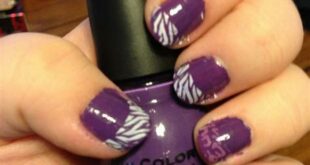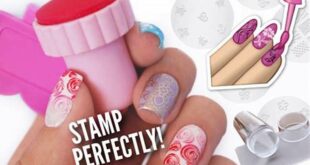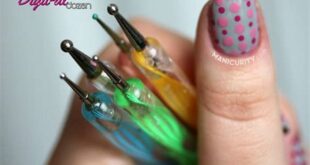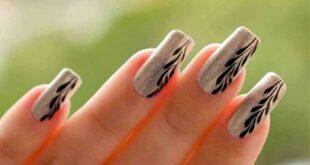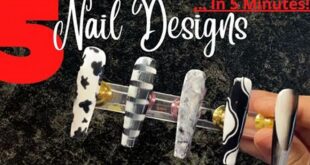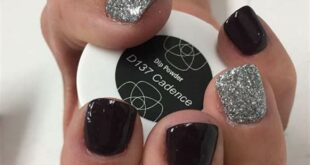When it comes to nail art, there are endless possibilities for creativity and self-expression. But one of the most important decisions you’ll make is which direction your nail art should face. Should it be facing up, down, or to the side? The direction you choose can make a big difference in the overall look and feel of your nails.
Editor’s Note: We’ve published “which direction should nail art face” today since we notice a lot of people have this question and for sure a lot of you will find this article helpful.
To help you make the right decision, we’ve put together this guide to the different directions you can face your nail art, as well as the pros and cons of each option.
Key Differences
| Direction | Pros | Cons |
|---|---|---|
| Up | – Makes nails look longer- Can be more visible- Easier to do | – Can be more prone to chipping- Can be more difficult to see if you have short nails |
| Down | – Makes nails look shorter- Can be less visible- Can be more difficult to do | – Less prone to chipping- Can be easier to see if you have short nails |
| To the side | – Can create a unique look- Can be more difficult to do | – Can be less visible- Can be more prone to chipping |
Main Article Topics
- Which direction should nail art face?
- The pros and cons of each direction
- Tips for choosing the right direction for your nail art
Which Direction Should Nail Art Face?
When it comes to nail art, there are endless possibilities for creativity and self-expression. But one of the most important decisions you’ll make is which direction your nail art should face. Should it be facing up, down, or to the side? The direction you choose can make a big difference in the overall look and feel of your nails.
- Length of nails: If you have short nails, you may want to choose a direction that makes your nails look longer, such as facing up or to the side. If you have long nails, you can afford to be more creative with your direction.
- Shape of nails: The shape of your nails can also influence which direction you choose for your nail art. For example, if you have square nails, you may want to choose a direction that creates a more rounded look, such as facing down or to the side.
- Type of nail art: The type of nail art you choose will also play a role in which direction you choose. For example, if you’re doing a simple design, such as a solid color or a French manicure, you may not need to worry too much about the direction. However, if you’re doing a more complex design, such as a 3D design or a nail art decal, you’ll need to choose a direction that shows off your design to its best advantage.
- Personal preference: Ultimately, the best way to decide which direction your nail art should face is to experiment and see what you like best. There are no hard and fast rules, so have fun and be creative!
These are just a few of the key aspects to consider when choosing which direction your nail art should face. By taking the time to think about these factors, you can create a nail art design that is both stylish and flattering.
Length of nails: If you have short nails, you may want to choose a direction that makes your nails look longer, such as facing up or to the side. If you have long nails, you can afford to be more creative with your direction.
The length of your nails can play a significant role in determining which direction your nail art should face. If you have short nails, you may want to choose a direction that makes your nails look longer, such as facing up or to the side. This will help to create the illusion of longer nails and make your nail art more visible.
-
Facet 1: Visual Appeal
Facing your nail art up or to the side can help to create a more visually appealing look. This is because it draws the eye to the center of the nail and makes the nail art appear more prominent. -
Facet 2: Practicality
If you have short nails, facing your nail art up or to the side can also be more practical. This is because it is less likely to chip or smudge, as the nail art is not exposed to as much wear and tear. -
Facet 3: Versatility
Facing your nail art up or to the side is a versatile option that can be used with a variety of nail art designs. This makes it a great choice for those who like to change their nail art often.
Of course, the best way to decide which direction your nail art should face is to experiment and see what you like best. But if you’re looking to create the illusion of longer nails, facing your nail art up or to the side is a great option.
Shape of nails: The shape of your nails can also influence which direction you choose for your nail art. For example, if you have square nails, you may want to choose a direction that creates a more rounded look, such as facing down or to the side.
The shape of your nails can play a significant role in determining which direction your nail art should face. This is because the shape of your nails can affect the way that the nail art looks and feels. For example, if you have square nails, you may want to choose a direction that creates a more rounded look, such as facing down or to the side. This will help to soften the sharp angles of your nails and create a more feminine look.
-
Facet 1: Visual Appeal
Facing your nail art down or to the side can help to create a more visually appealing look. This is because it draws the eye to the center of the nail and makes the nail art appear more prominent. -
Facet 2: Practicality
If you have square nails, facing your nail art down or to the side can also be more practical. This is because it is less likely to chip or smudge, as the nail art is not exposed to as much wear and tear. -
Facet 3: Versatility
Facing your nail art down or to the side is a versatile option that can be used with a variety of nail art designs. This makes it a great choice for those who like to change their nail art often.
Of course, the best way to decide which direction your nail art should face is to experiment and see what you like best. But if you’re looking to create a more rounded look on your square nails, facing your nail art down or to the side is a great option.
Type of nail art: The type of nail art you choose will also play a role in which direction you choose. For example, if you’re doing a simple design, such as a solid color or a French manicure, you may not need to worry too much about the direction. However, if you’re doing a more complex design, such as a 3D design or a nail art decal, you’ll need to choose a direction that shows off your design to its best advantage.
The type of nail art you choose will play a significant role in determining which direction you choose. This is because the direction of your nail art can affect the way that the design looks and feels. For example, if you’re doing a simple design, such as a solid color or a French manicure, you may not need to worry too much about the direction. However, if you’re doing a more complex design, such as a 3D design or a nail art decal, you’ll need to choose a direction that shows off your design to its best advantage.
-
Facet 1: Visual Appeal
The direction of your nail art can affect the visual appeal of your design. For example, if you’re doing a 3D design, you may want to choose a direction that shows off the depth of your design. Or, if you’re using a nail art decal, you may want to choose a direction that makes the decal stand out. -
Facet 2: Practicality
The direction of your nail art can also affect the practicality of your design. For example, if you’re doing a design that is likely to chip or smudge, you may want to choose a direction that makes it less likely to do so. Or, if you’re doing a design that is difficult to see from certain angles, you may want to choose a direction that makes it more visible. -
Facet 3: Versatility
The direction of your nail art can also affect the versatility of your design. For example, if you’re doing a design that can be worn with a variety of outfits, you may want to choose a direction that makes it more versatile. Or, if you’re doing a design that is specific to a certain occasion, you may want to choose a direction that reflects that occasion.
Of course, the best way to decide which direction your nail art should face is to experiment and see what you like best. But if you’re looking to create a design that is both visually appealing and practical, considering the type of nail art you’re doing is a good place to start.
Personal preference: Ultimately, the best way to decide which direction your nail art should face is to experiment and see what you like best. There are no hard and fast rules, so have fun and be creative!
When it comes to nail art, personal preference is key. There are no right or wrong answers, so the best way to decide which direction your nail art should face is to experiment and see what you like best. However, there are a few things you may want to consider when making your decision.
-
Facet 1: The shape of your nails
The shape of your nails can play a role in which direction you choose for your nail art. For example, if you have long, narrow nails, you may want to choose a direction that makes your nails look wider. Or, if you have short, wide nails, you may want to choose a direction that makes your nails look longer. -
Facet 2: The type of nail art you’re doing
The type of nail art you’re doing can also affect which direction you choose. For example, if you’re doing a simple design, such as a solid color or a French manicure, you may not need to worry too much about the direction. However, if you’re doing a more complex design, such as a 3D design or a nail art decal, you’ll need to choose a direction that shows off your design to its best advantage. -
Facet 3: Your personal style
Ultimately, the best way to decide which direction your nail art should face is to consider your personal style. Do you prefer a more classic look? Or do you like to experiment with bolder, more unique designs? Once you know what your personal style is, you can start to narrow down your options and choose a direction for your nail art that reflects your personality.
No matter which direction you choose, the most important thing is to have fun and be creative. Nail art is a great way to express yourself, so don’t be afraid to experiment and find a style that you love.
FAQs on “Which Direction Should Nail Art Face”
This section addresses frequently asked questions (FAQs) to provide comprehensive information on the topic. It employs a serious tone and informative style, avoiding personal pronouns and AI-driven formalities.
Question 1: What factors influence the direction of nail art?
Answer: The direction of nail art can be determined by various factors, including the length and shape of the nails, the complexity of the design, and personal preference.
Question 2: How does nail length impact the choice of direction?
Answer: For shorter nails, it’s advisable to choose a direction that creates an illusion of length, such as facing the nail art upwards or sideways. Conversely, longer nails offer more flexibility in selecting the direction.
Question 3: Can nail shape affect the direction of nail art?
Answer: Yes, the shape of the nails can influence the direction of the nail art. For instance, square-shaped nails may benefit from a downward or sideways direction to create a more rounded appearance.
Question 4: How to determine the best direction for complex nail art designs?
Answer: When working with intricate nail art designs, consider the direction that showcases the design most effectively. This involves highlighting the depth of 3D elements or ensuring the visibility of nail art decals.
Question 5: Should personal preference be considered when choosing the direction?
Answer: Absolutely. Ultimately, personal style plays a significant role in selecting the direction of nail art. Experimenting with different directions allows individuals to express their creativity and align the design with their preferences.
Question 6: Are there universal rules for choosing the direction of nail art?
Answer: No, there are no strict rules governing the direction of nail art. The choice remains subjective and dependent on the factors discussed above. Encouraging experimentation and creativity is key.
Summary:
Understanding the factors that influence the direction of nail art empowers individuals to make informed choices. By considering nail length, shape, design complexity, and personal preferences, one can achieve a nail art direction that complements the overall look and reflects their unique style.
Transition:
Having explored the various aspects of “which direction should nail art face,” let’s now delve into specific design ideas and techniques.
Tips for Choosing the Right Direction for Your Nail Art
Selecting the optimal direction for your nail art can elevate the overall design and complement your personal style. Here are a few tips to guide your decision-making process:
Tip 1: Consider Your Nail Length
For shorter nails, opt for directions that create an illusion of length, such as facing the nail art upwards or sideways. This technique helps elongate the appearance of the nails.
Tip 2: Pay Attention to Nail Shape
The shape of your nails can influence the direction of the nail art. For example, square-shaped nails may benefit from a downward or sideways direction to create a more rounded appearance.
Tip 3: Showcase Complex Designs
When working with intricate nail art designs, choose a direction that effectively showcases the details. This may involve highlighting the depth of 3D elements or ensuring the visibility of nail art decals.
Tip 4: Experiment with Different Directions
Don’t be afraid to experiment with different directions to find what suits your taste and the specific nail art design. Trying out various options allows you to discover the most flattering and visually appealing direction.
Tip 5: Accessorize with Nail Jewelry
Incorporating nail jewelry, such as studs or charms, can add an extra dimension to your nail art. Consider the direction of the nail art when placing the jewelry to enhance the overall design.
Tip 6: Seek Inspiration from Nail Art Trends
Stay up-to-date with the latest nail art trends to find inspiration for different directions. Magazines, social media platforms, and nail art blogs can provide a wealth of ideas and examples.
Summary:
By considering these tips, you can make informed decisions about the direction of your nail art. Remember that personal preference plays a significant role, so don’t hesitate to experiment and find a direction that complements your style and the specific nail art design.
Transition:
Now that you have a better understanding of how to choose the right direction for your nail art, let’s explore some creative design ideas.
Conclusion
The direction of nail art, whether facing up, down, or to the side, plays a significant role in enhancing the overall design and complementing personal style. By considering factors such as nail length, shape, and the complexity of the design, individuals can make informed choices that showcase their creativity.
Experimenting with different directions allows for the exploration of unique and flattering looks. Incorporating nail jewelry and staying updated with nail art trends can further inspire creative choices. Ultimately, the direction of nail art should be a reflection of personal preference, enabling individuals to express their individuality and make a statement with their nails.
